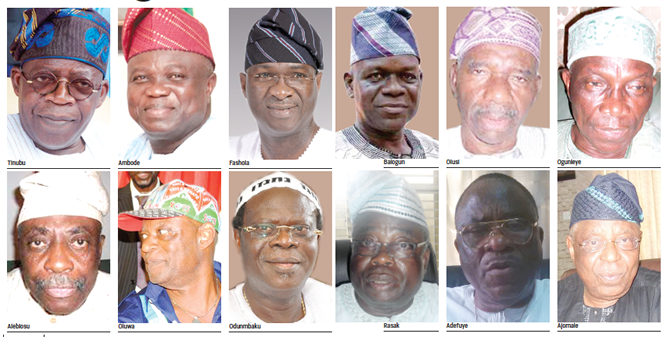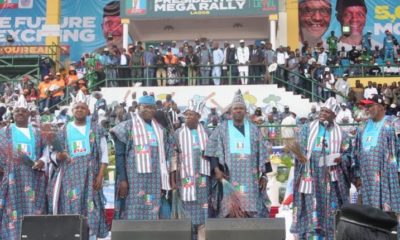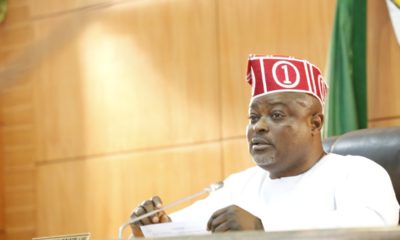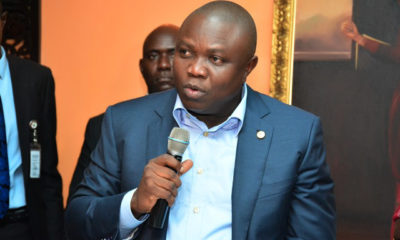Opinion
How 2019 Elections Will Shape Southwest Polls

The premier newspaper in this report reviews some of the major political events that took place in the Southwest in 2018 and how they may affect the 2019 general elections
The year 2018 will certainly go down in the political history of the South West as eventful, for recording some very phenomenal developments that may shape the 2019 elections in the zone.
From Lagos to Ogun, Ekiti to Osun, Oyo and Ondo, major political actors in a bid to maneuver their opponents and remain relevant caused major upsets in the political space especially during the primaries of the ruling party, the All Progressives Congress, APC. The conundrum that trailed some of the primaries across most of the parties is yet to settle.
Specifically, the Peace and Reconciliation Committee set up by the APC to address concerns and grievance of those who lost out in the party’s primaries held between September 29 and October 6 has so far been unable to persuade aggrieved members to sheathe their swords. This means that the APC in the South West may be going into the 2019 election with a divided house.
Lagos State
Lagos State recorded a major upset in the political turf with the dropping of Governor Akinwunmi Ambode from proceeding with his second term ambition in 2019 by the state leadership of the All Progressives Congress (APC).
This was said to be despite interventions by President Muhammadu Buhari’s proxies and governors aimed at staving off what they claimed was a damaging crisis in one of the party’s strongest bases.
Political observers say Ambode lost out not because he was not performing but simply because he fell out with party leaders across the state, and was therefore tagged “not a party man”.
In his place, Babajide Sanwo-Olu, a former Special Adviser, commissioner and immediate past chief executive officer of the largest public corporation in the Centre of Excellence, the Lagos State Property development Corporation, was favoured with the governorship ticket of the party.
Mr Ambode will thus go down in the history of the state as the first governor to do one term in the current dispensation.
A similar fate befell Senator Gbenga Ashafa, Lagos East ostensibly for being at Ambode’s earlier declaration.
Some watchers of Lagos politics say there may be upset at the election, given the array of contenders from the other political parties whose profiles and personal achievements are intimidating, but unfortunately, the gubernatorial candidates have rather than base their campaigns on issues, have continued to pursue the mundane, focusing on Tinubu’s stranglehold on Lagos..
Unlike in 2015 governorship election where Tinubu’s candidate, Mr Akinwunmi Ambode had only the Peoples Democratic Party (PDP) candidate, Mr Jimi Agbaje to contend with, this time Mr Sanwo-Olu and the APC will have Mr Babatunde Gbadamosi of the Action Democratic Party, ADP; Chief Owolabi Salis of the Alliance for Democracy, AD; Mr Jimi Agbaje again and few others to contend with.
A source close to Ambode’s camp said, “It is sad though. End of one-man’s rule may finally be here. There is enormous interest in what those disaffected with Lagos APC primaries will do. It will significantly affect presidential and governorship elections results in Lagos. If they all act their conscience and hidden agenda, then an earthquake will happen in Lagos.
“It is the era of the revolution to free Lagos now. Tinubu may have installed the last governor in open elections.”
In August, the gruesome murder of the chairman of the PDP in Apapa Local government created viral ripples which had yet to settle in the party. One of the outcomes of the aftermath of the murder was the defection of the erstwhile state chairman of the party to the APC, alongside his supporters.
Ekiti State
Ekiti state experienced a major upset in the July governorship election with the immediate past governor of the state, Mr Ayodele Fayose, of the PDP being the biggest casualty. His political son and deputy, Prof. Kolapo Olusola and flag bearer of the PDP in the election reportedly lost Irepodun/Local Government Area, where Mr Fayose hails from to Mr Kayode Fayemi of the APC whom Fayose beat in 2014 with the infamous 16-0 defeat.
The battle has since shifted to the Election Petition Tribunal as Prof. Olusola headed to the tribunal to challenge Fayemi’s victory which was allegedly manipulated by the Independent National Electoral Commission, INEC and security operatives.
The two senators and five House of Representatives members still with Fayose lost in their local government areas just as the senator representing Ekiti South, Senate Deputy Minority Leader, Mrs. Biodun Olujimi, lost her Ekiti East Local Government to the APC.
House of Representatives members in Ekiti South, Akin Awodumila and Segun Adekola lost in Gbonyin and Ekiti South-West where they hail from in the same manner Senator Duro Faseyi (Ekiti North) lost his Ilejemeje Local Government to APC. Two other House of Representatives members, Thaddeus Aina and Kehinde Agboola, lost in in Ido/Osi and Ikole council areas.
Another big casualty was the Speaker of the House of Assembly Mr. Kola Oluwawole, who lost his Moba Local Government Area to APC, alongside the lawmaker for Moba 2, Mr. Badejo Anifowose.
Several commissioners and local government chairmen could not deliver their council areas in the APC hurricane that has confounded political pundits.
For the PDP, it is believed that the outgoing ruling party suffered some internal sabotage from senior members, who did not believe in Olusola’s candidacy.
The APC’s victory was largely attributed to the success of the post-primary reconciliation. Nobody defected. All the party’s leading lights were on the same page, unlike in the PDP where some key members, including former Minister of Works, Prince Adedayo Adeyeye, defected to the APC.
Osun State
The Osun State governorship election also produced some upsets following the victory of Gboyega Oyetola, the candidate of the APC winner of the 2018 election.
Mr Oyetola was returned as governor-elect at the end of a supplementary election which held in seven polling units across four local governments. INEC had scheduled the rerun after declaring the earlier election inconclusive; saying the margin of votes with which the leading candidate, Senator Ademola Adeleke of the PDP polled was less than the number of cancelled votes in the seven polling units.
The APC candidate won six of the seven units amidst allegations of harassment and other forms malpractice. At the end of the tally of votes, the APC candidate scored a total of 255,505 votes while the PDP candidate scored a total of 255,023 votes.
Despite the irregularities reported by journalists and observers, INEC officials at the collation centre all said the election went on smoothly.
But one major upset in the election was the support of the Social Democratic Part, SDP, candidate in the election, Senator Iyiola Omisore who became a beautiful bride to be courted by the PDP and the APC and against all expectations; Omisore pitched his tent with the APC, a development which gave the party its victory.
Similarly, the crisis that trailed the APC primaries in the state is yet to settle as some leaders of the party that defected to the Action Democratic Party (ADP) had not returned a situation that could undermine the victory of APC in the state if the party leadership failed to bring them back before the 2019 general election.
Pundits say the ADP governorship candidate in Osun, Alhaji Moshood Adeoti “is still influential. Yet, Adeoti is not happy with the way he was forced out of the APC before the 2018 governorship contest in the state. The APC may lose some legislative seats if the case of Adeoti is not attended to.”
Oyo State
Oyo State was not insulated from major upsets arising from the APC primaries. Like other aspirants that contested different primaries, the Minister for Communications, Mr. Shittu Adebayo, vowed not to support the APC governorship candidate in the state, Chief Adebayo Adelabu.
Mr Adebayo’s reason is that Adelabu is a stooge of the APC National Leader, Senator Bola Ahmed Tinubu.
The minister threatened that there would be no peace in the ruling APC, especially in Oyo State chapter without restitution and justice due to what he ascribed to injustice and unfairness that characterised the APC primaries in the state.
“So, restitution should come before the reconciliation. With this injustice, I will be a bastard to support the APC candidate in Oyo State in the next governorship election after I was defrauded out of the party’s primary election held last October.”
Ogun State
The refusal of the National Chairman of the APC, Adams Oshiomhole, to accept Governor Ibikunle Amosun’s preferred choice of governorship candidate in Ogun State has worsened the crisis rocking the party in the state.
The state executive of the party insisted it would only recognize Adekunle Akinlade as the APC’s governorship candidate and vowed not to work for its governorship candidate, Dapo Abiodun, in 2019 except President Muhammadu Buhari directed otherwise.
Despite all efforts by the Presidential Reconciliation Committee led by Sandra Oladele to settle all aggrieved parties including Governor Amosun, the latter have threatened to work against the APC during the 2019 general election.
Already, Amosun’s allies, who lost out in the party’s primaries, had defected to the Allied Peoples’ Movement, APM, to pursue their political aspirations.
Prominent among Amosun’s allies that defected were Hon. Adekunle Akinlade, who in vain sought the Ogun APC governorship nomination; Hon. Mukaila Kazeem, who was seeking a return ticket to the Abeokuta North/Obafemi-Owode-Odeda federal constituency seat and Chief Tolu Odebiyi, who resigned from the APC after losing the Ogun West senatorial ticket.
Observers argue that these defections may negatively affect the ruling party in the state in the 2019 elections.
On the other hand, gladiators in the Ogun State governorship contest on the PDP platform are yet to sheathe their sword. The national leadership of the party, recently, in Abuja, presented Ladi Adebutu with the symbolic party flag, as its Ogun State governorship candidate.
National chairman of the party, Prince Uche Secondus, said the party had submitted Adebutu’s name to INEC as required by law, adding that by the presentation, Adebutu is the authentic governorship candidate of the party for Ogun State.
But in a swift reaction, Senator Buruji Kashamu, who was recently recognised by INEC as the party’s governorship candidate in the state based on the ruling by a Federal High Court, said that Secondus should be held responsible “for breach of public peace and safety should there be a breakdown of law and order in Ogun State” in the build up to the 2019 general election.
”The desperation shown by Secondus is only typical of a mercenary who is hell-bent on delivering on the job he has been paid to do. His latest action was done in utter disregard to the party’s constitution and subsisting judgment of courts – from the High Court to the Supreme Court – which the INEC has since complied with.
“What is more, even if PDP presents 10,000 flags to Adebutu, it does not change the fact that the courts have pronounced the Engr. Adebayo Dayo-led Ogun State PDP Exco as the only party structure recognized by the law in Ogun State. It is merely ceremonial. It does not change the lists of candidates accepted, processed and published by INEC. It cannot change the verdicts of the High Court, the Court of Appeal and the Supreme Court. It cannot also change the wide acceptance of our aspiration by the good people of Ogun State and beyond.”
Political watchers in Ogun State say this state of affairs may likely cost the PDP the state.
Ondo State
Although, the governorship election will not be taking place in 2019, the governor, Mr. Rotimi Akeredolu, is being accused of unjust treatment and unfair play during the party primaries in the state.
20 lawmakers of the State House of Assembly, who were denied return tickets, accused the NWC of highhandedness and imposition, claiming that only six lawmakers were offered return tickets.
They claimed that Akeredolu denied them return tickets after the APC National Working Committee, NWC, had agreed to reward all the senators and federal lawmakers that supported President Buhari during the face-off with the National Assembly.
It was gathered that Akeredolu worked against the senator representing Ondo North Senatorial District, Prof. Ajayi Boroffice and his counterpart in Ondo South Senatorial District, Senator Omoyele Omogunwa. It took the intervention of the presidency before they could secure their return tickets.
At the moment, Akeredolu’s allies and aides are said to have defected to the Action Alliance, AA, to pursue their political aspiration. Dr. Tunji Abayomi, who was a senatorial aspirant in Ondo North, defected to the AA just after the primaries. Among others, Mr. Lucky Ayedatiwa, another senatorial aspirant in Ondo South, also defected.
Akeredolu had also vowed “not to support all the aspirants imposed on the Ondo APC in the contest for the national and state assemblies.
From the state of affairs in the affected states, observers say the peace committee might not be able to address diverse issues of injustice and unfair treatment, which most aggrieved aspirants alleged, characterised the APC primaries conducted and this may cause major upsets in the 2019 elections in the South West.
These major events will one way or the other shape the 2019 elections and the Southwest may never remain the same again.












